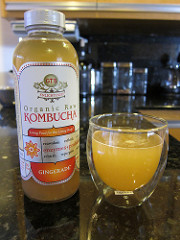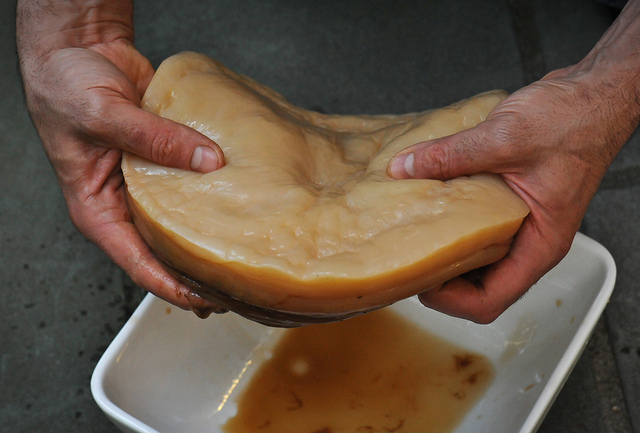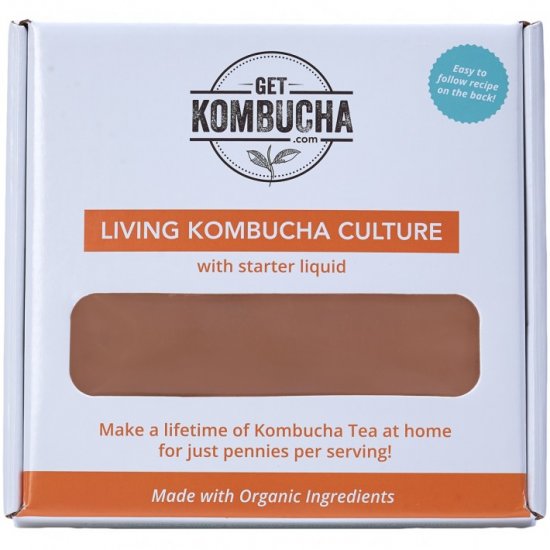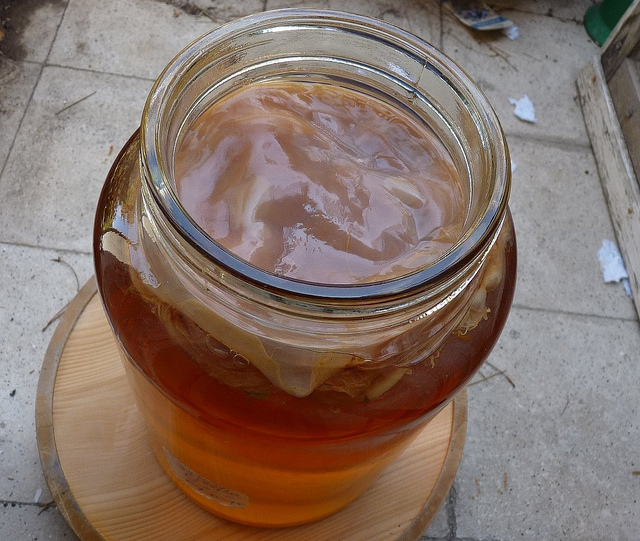Once you try your first bottle of store-bought kombucha, you’ll probably become a fan for life. No, wait…scratch that. If you’re anything like me, you’ll get hooked and become a die-hard kombucha addict! At $4 (or more) for a 16-ounce bottle, your habit is going to become more expensive than a latte fixation. And then, before long, you’re going to find yourself Googling “how to make your own kombucha at home,” just like I did.

For the uninitiated, kombucha is a fermented beverage made from sugar, tea, and a living kombucha culture. Unflavored kombucha is both slightly acidic and slightly sweet. The longer you brew it, the less sweet it becomes because the kombucha culture continues to feed on the sugar in the tea and uses it up.
When brewing is complete, you can add ingredients like ginger, herbs, dried fruits, dried flowers, or extracts to flavor the drink to suit your personal preference. Fizzy and refreshing, kombucha makes a terrific substitute for commercial carbonated sodas.
Kombucha Is a Health Tonic*
Kombucha detoxifies the liver and dramatically boots immune function. Like all fermented foods, it’s alkalizing and makes the body more resistant to degenerative diseases and cancers.
Kombucha drinkers report a wide variety of health benefits, including improved digestion, weight loss, improved energy, and reduced stress. Many claim that itcures constipation, skin problems, and hangovers. Some people even notice that kombucha restores hair color and strengthens the hair.
The wide variety of complaints relieved by Kombucha is almost not comprehensible. But it is explainable on the basis that Kombucha does not target a specific body organ but, rather, influences the entire organism positively by effecting a stabilization of the metabolic situation and the detoxifying effect of its glucuronic acid. In many, this leads to a heightened endogenic defense capacity against those toxic influences and environmental stresses which inundate us from many sides. The result is the invigoration of a damaged cellular metabolism, and the restoration and firming up of one’s well-being.
~ Gunther W. Frank, leading authority on kombucha tea and author of Kombucha: Healthy Beverage and Natural Remedy from the Far East
It All Starts with a SCOBY
One of the first things you’ll discover is that the kombucha brewing process begins with a weird, slimy thing called a SCOBY. Remarkably, the SCOBY — which looks like a flat rubbery mushroom — is what gives kombucha its famous, health-promoting benefits.SCOBY stands for Symbiotic Culture of Bacteria and Yeast, and it’s the secret ingredient that turns sugar-sweetened tea into kombucha.
All over the internet, you see kombucha brewers obsessing about their SCOBY. Is it healthy? Does it float? Does it sink? Does it stink? Does it have black spots? The list of things people worry about is practically endless. But, truthfully, there’s no need to worry if you start out with a top-notch SCOBY and follow the directions carefully.

Our kombucha making supplies are of the highest quality, and we think our SCOBY is the best on the market. We get our freshly grown, organic SCOBYs from Kombucha Dave, and when you buy your kombucha products from us, you get a discount, plus all the instructions, videos, and support you need to brew your own kombucha for life.

About the Brewing Process
Simply stated, to make kombucha, you add your SCOBY to a gallon jar containing sweetened tea that has been allowed to cool. It starts out looking like this:

Then cover it, and let it sit in a clean, warm place like on your kitchen counter. In a few days, it’ll be ready to drink. Best of all, you’ll have an unlimited supply of kombucha for just pennies a bottle.
By the way…
Our good friend Kombucha Dave has a fascinating article on his blog where he talks about why a SCOBY is sometimes mistakenly called a mushroom. He has kindly given us his permission to republish it here. Enjoy!
Is Kombucha Really a Mushroom?
One of the most frequently asked about Kombucha is, “Is kombucha really a mushroom?” It’s because most people call it Kombucha mushroom. Some people call it Kombucha SCOBY. But kombucha mushroom is the most common. So, is it really a mushroom?

No it is not, maybe at most it could be called fungie, or a type of fungi. I’m a type of fun guy, but again you can call it a Kombucha mushroom, we refer to it sometimes on our site as mushroom tea, mainly because that’s how other people refer to it. So if you’re at a party and someone says, “oh this kombucha mushroom tea is awesome”. Don’t take the bottle and spill it on them and say it’s not really a mushroom, but let’s talk about how it got it’s name then.
How did Kombucha turn into mushroom? Well the theory is, the story goes like this, in Japan, they were brewing something with seaweed and ‘Kombu’ actually means seaweed in Japan and ‘cha’ means tea. So it was originally called seaweed tea, and they were using seaweed, it wasn’t Kombucha, but a culture came about. Something to keep in mind, there’s lots of things to ferment that will form a culture, but not necessarily makes it Kombucha, make sense?
A mother vinegar forms a culture, you have sour dough starters, wine uses cultures and things like that, so eventually what happened  is that at the same time, people were also doing Kombucha tea. They saw the culture, so I’m looking at the seaweed culture we called Kombucha and I’m looking at this Kombucha culture and I’m just going to label it Kombucha, so there you go. In addition to that, to make things even more confusing, if you ever look at a Kombucha SCOBY or a Kombucha culture, I kind of think it does look like a cap of let’s say a portobello mushroom, so again hopefully that answers your question, is Kombucha a mushroom.
is that at the same time, people were also doing Kombucha tea. They saw the culture, so I’m looking at the seaweed culture we called Kombucha and I’m looking at this Kombucha culture and I’m just going to label it Kombucha, so there you go. In addition to that, to make things even more confusing, if you ever look at a Kombucha SCOBY or a Kombucha culture, I kind of think it does look like a cap of let’s say a portobello mushroom, so again hopefully that answers your question, is Kombucha a mushroom.
Also, I’d like to think that it is called kombucha mushroom because it looks like a mushroom and the texture is similar to a mushroom’s texture.
* Per FDA regulations, we can’t tell you about the health benefits of kombucha without also disclosing the following:
Legal Disclaimer Information about the health benefits of kombucha is for educational purposes only. These statements have not been evaluated by the FDA. This information is not medical advice, nor is it intended to replace the advice or attention of a qualified health-care professional.

